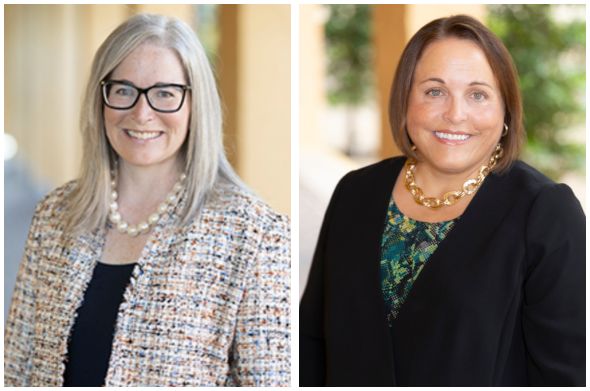Fall ’25 Orientation Features Session on AI

For law students and legal professionals alike, generative artificial intelligence is a double-edged sword: a powerful tool that can enhance work and save time, but only if one knows how and why to use it.
Starting in fall of 2025, Stetson Law’s orientation will now include a training on best practices when using the paradigm-shifting tech in coursework and as legal professionals.
“Generative AI has touched nearly every aspect of our lives, especially in higher education,” said Associate Dean for Assessment and Professional Engagement Anne Mullins. “Orientation is the perfect opportunity to demonstrate how, if used correctly, these tools can support our students’ work as they develop important lawyering skills like attention to detail and critical thinking.”
Important lesson before class is in session
Generative AI is a powerful resource for law students. They can use it as a study aid, a brainstorming tool, and in some of the research they do as students and, eventually, as lawyers. Yet some might not be clear on how to reap the benefits of AI while avoiding poor information sourcing, plagiarism, or overreliance that can interfere with learning.
Designed and led by Dr. Kirsten Davis Professor of Law and Provost’s Faculty Fellow for Generative AI and Higher Education, the orientation course will introduce students using Generative AI ethically and effectively as students and as future legal professionals.
Since incoming students might have varying understandings of the tech and its uses, orientation is the perfect time to establish a baseline from which all students can work.
“I expect that students are wondering how generative AI is impacting law practice and law school and want to know how they should or should not use the tools,” Davis said. “There are many potential missteps with generative AI, and it’s our duty to start students off right.”
She hopes this will help them avoid pitfalls like relying on hallucinated information, examples of which have been seen in court cases where lawyers have included false case citations and fake quotations in court filings.
“Generative AI tools talk to us in our language, but they are not truth machines,” Davis said. “Law students need to understand this at the very start of law school.”
What’s on the agenda
Incoming 1Ls will learn about the technology behind generative AI, its strengths and weaknesses for advocacy and communication, and best practices for ethical use.
“Importantly, students will get advice on appropriate uses for gen AI in their legal education. A significant goal of this training is to ensure that generative AI tools don’t interfere with their legal education,” Davis said.
In keeping with Stetson Law’s commitment to practice-readiness and professional identity formation, the training also promotes an approach to lawyering that emphasizes ethical advocacy, effective legal communication, preparedness, diligence, and inclusivity.
“These values include a sense of responsibility to clients, the profession, the rule of law, and a commitment to actively developing the competencies needed for excellence as a lawyer,” Davis said. “The increasing use of generative AI by lawyers suggests that law students will need a framework for understanding how their character as lawyers intersect with the ability of generative AI tools to produce legal communication.”
The bigger picture
The session takes place amid an innovative orientation program that in 2023 was recast into a holistic, interactive format inspired by the inns of court tradition. The program has proven effective in bolstering confidence and creating a sense of community among students as they learn about life as a legal professional.
The American Bar Association recently selected the Inns program for the E. Smythe Gambrell Professionalism Award. The national recognition honors exemplary and innovative programs that promote professionalism.
Earlier this year, the Florida Bar Standing Committee on Professionalism recognized program organizers with its Group Professionalism Award.
To leadership, incorporating AI will ensure 1L orientation – and the Stetson Law experience itself – will equip students for success as lawyers.
“The ability to use generative AI is going to become a foundational lawyering skill in the coming years,” Mullins said. “Stetson graduates will be ahead of the curve in this area, just like they are in other foundational skills.”
Post date: July 31, 2025
Media contact: Kate Bradshaw
[email protected] | 727-430-1580